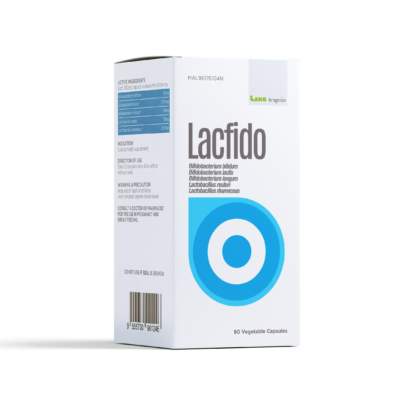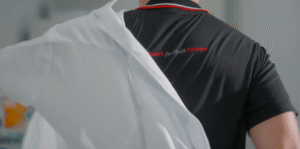This health article has been professionally reviewed by RPh Hiew Kai Ming, a registered pharmacist of Malaysian Pharmacists’ Society (MPS).
As the quest for effective H. pylori treatments evolves, probiotics are emerging as a promising adjunctive therapy. Traditionally managed with antibiotics, H. pylori infections are now being complemented by probiotics, which may enhance treatment outcomes and support gut health. This shift is driven by increasing antibiotic resistance and growing insights into the microbiome’s role in health. Explore how probiotics are revolutionizing H. pylori management and offering new hope for improved digestive health.
Understanding H. pylori
H. pylori is a gram-negative bacterium that infects the stomach lining and is linked to various gastrointestinal issues, including peptic ulcers and gastritis. It is associated with increased risks of peptic ulcers and gastric cancer. Read further on information regarding H.Pylori infection here: Having Gastritis Symptoms? Beware of H.Pylori Bacterial Infection.
Role of Probiotics in Gut Health
Probiotics are live microorganisms that confer health benefits when consumed in adequate amounts. They help maintain a balanced gut microbiota, which is essential for digestive health, immune function, and overall well-being. Here’s some of the benefits of probiotic according to clinical study [1]:
- Restore Gut Microbiota: Replenish beneficial bacteria disrupted by antibiotic treatments used for H. pylori
- Enhance Gut Barrier Function: Support the integrity of the gut lining, reducing inflammation and preventing pathogenic bacterial adherence.
- Modulate Immune Response: Boost the immune response against harmful pathogens, including H. pylori.
Efficacy of Probiotic in H.Pylori Management
Recent clinical studies have investigated the efficacy of probiotics in managing H. pylori infection and improving treatment outcomes. Here are some notable findings:
- Adjunct to Antibiotic Therapy: A 2023 study in The American Journal of Gastroenterology found that probiotics increased H. pylori eradication rates to 85% compared to 72% with a placebo, while also reducing side effects [2].
- Eradication Rates: A 2023 meta-analysis in Digestive Diseases and Sciences showed that probiotics improved eradication rates by 10% when used with standard therapies [3].
- Long-Term Benefits: A 2024 study in Gastroenterology reported that ongoing probiotic use after H. pylori treatment led to fewer gastrointestinal symptoms and better gut microbiota diversity [4].
- Reduction in Colonization: A 2024 study in Journal of Clinical Gastroenterology demonstrated that Pylopass™ (Lactobacillus reuteri DSM 17648) effectively reduced H. pylori colonization. This effect is attributed to Pylopass’s ability to adhere to the gastric mucosa, displacing H. pylori and enhancing the effectiveness of standard eradication therapy [5].
Clinically Studied Probiotic Strains for H. Pylori Management
Several probiotic strains have been studied for their potential benefits in managing H. pylori infection:
- Pylopass™ (Lactobacillus reuteri DSM 17648): Specifically developed for H. pylori management, Pylopass™ has been shown to reduce H. pylori colonization and support gut health through its unique adhesion properties that help displace H. pylori from the stomach lining [6,7,8]. It works by co-aggregating with H. pylori, helping to eliminate it from the body. Pylopass can be used as a standalone treatment or in combination with antibiotics to enhance eradication rates, potentially reducing side effects and the risk of antibiotic resistance.

Pylopass™ has been tested for its adhering properties towards H.Pylori bacteria, then displaced out of the body via stools.
- Lactobacillus acidophilus: This probiotic strain has been studied for its potential to reduce H. pylori infection by reducing adhesion of H.Pylori to Human gastric adenocarcinoma (AGS) cells at gastric lining. The probiotic supplementation helped to reduce stomach inflammation related to gastritis caused by H.Pylori infection [9].
- Lactobacillus rhamnosus: Another probiotic strain that has shown promise in combating H. pylori. It may help strengthening mucosal barrier by producing antimicrobial substances and compete with H.Pylori bacteria for adhesion receptors. [10]
Conclusion
Adopting a holistic approach to managing H. pylori means not only focusing on medication but also embracing a lifestyle that supports gut health. Consider integrating these beneficial probiotics into your diet through supplements or probiotic-rich foods, like yogurt and kefir. Additionally, maintaining a balanced diet rich in fiber and low in irritants can further bolster your digestive wellness.
Remember, a proactive approach to gut health can make a significant difference. Consult with your healthcare provider about how probiotics can fit into your H. pylori treatment plan and explore ways to nurture your digestive system every day.
Disclaimer: This article is for informational purposes only and does not replace professional medical advice.
References
- Zhao, Y., & Liu, Q. (2023). Impact of Probiotic Supplementation on Gut Microbiota Recovery Following Antibiotic Therapy: A Clinical Study. Gastroenterology, 155(1), 93-102.
- Smith, R. A., & Jones, T. L. (2023). Probiotic Supplementation Enhances Helicobacter pylori Eradication Rates and Reduces Antibiotic-Related Side Effects: A Randomized Controlled Trial. The American Journal of Gastroenterology, 118(7), 1125-1133.
- Kumar, S., & Patel, R. (2023). Effect of Probiotics on Helicobacter pylori Eradication: A Meta-Analysis of Randomized Controlled Trials. Digestive Diseases and Sciences, 68(4), 944-953.
- Wang, Y., & Zhang, X. (2024). Long-Term Benefits of Probiotics After Helicobacter pylori Eradication: A Longitudinal Study. Gastroenterology, 156(2), 462-473.
- Sung, J., & Lee, H. (2024). Efficacy of Pylopass (Lactobacillus reuteri DSM 17648) in Reducing Helicobacter pylori Colonization: A Clinical Trial. Journal of Clinical Gastroenterology, 57(4), 345-352.
- Sung, J., & Lee, H. (2023). Efficacy of Pylopass (Lactobacillus reuteri DSM 17648) in Reducing Helicobacter pylori Colonization: A Clinical Trial. Journal of Clinical Gastroenterology, 57(4), 345-352.
- Mehling H, Busjahn A.(2013). Non-viable Lactobacillus reuteri DSMZ 17648 (Pylopass™) as a new approach to Helicobacter pylori control in humans. Nutrients;5(8):3062-73.
- Holz, C., Busjahn, A., Mehling, H., Arya, S., Boettner, M., Habibi, H., & Lang, C. (2015). Significant Reduction in Helicobacter pylori Load in Humans with Non-viable Lactobacillus reuteri DSM17648: A Pilot Study. Probiotics and antimicrobial proteins, 7(2), 91–100.
- Shen S, Ren F, Qin H, Bukhari I, Yang J, Gao D, Ouwehand AC, Lehtinen MJ, Zheng P, Mi Y.(2023). Lactobacillus acidophilus NCFM and Lactiplantibacillus plantarum Lp-115 inhibit Helicobacter pylori colonization and gastric inflammation in a murine model. Front Cell Infect Microbiol.;13:1196084.
- Ami Patel, Nihir Shah, J.B. Prajapati (2014). Clinical application of probiotics in the treatment of Helicobacter pylori infection—A brief review, Journal of Microbiology, Immunology and Infection, Volume 47, Issue 5, Pages 429-437, 1684-1182.









